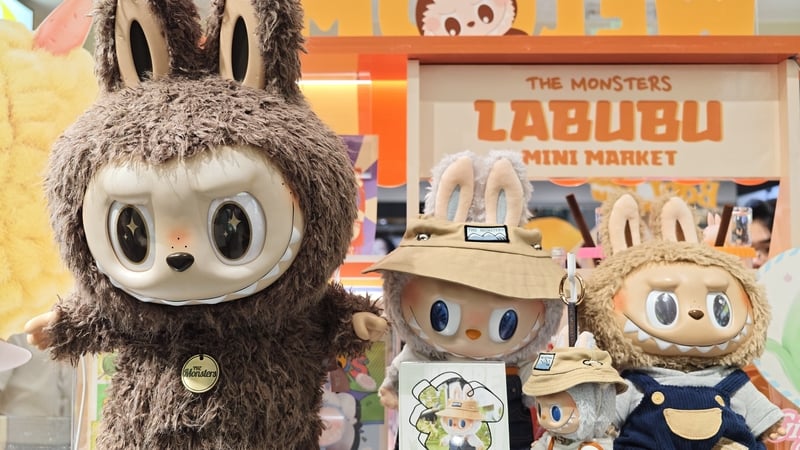Creepy or cute? It depends who you ask.
But what’s undisputable is how incredibly popular the Labubu has become in recent months.
Usually taking the form of a small, plush-like keyring, a Labubu can also take the shape of a larger teddy or figurine.
Although they’re not actually called Labubu – that’s just the name of one of the characters that people can buy. Officially the range of toys is known as ‘The Monsters’.
And they’ve been around for a lot longer than you might think. They were created in 2015 by an artist called Kasing Lung, who was born in Hong Kong but raised in the Netherlands, before moving to Belgium.
Initially they were little vinyl figurines – and they proved relatively popular within China. But in 2019 Lung struck a partnership with a Chinese toy company called Pop Mart, which is where things began to really take off.
Because they were the company that made the plush versions of the monsters, including ones that you could clip onto your bag. These proved much more popular with Chinese consumers, especially in the aftermath of the pandemic. There is a view that they tapped into a desire among consumers for something that wasn’t perfect and polished – they wanted to buy toys and teddies that looked a little offbeat like this.
Some think it’s also an example of the Lipstick Effect – the (contested) economic theory that when people are under financial pressure, they will opt to treat themselves to smaller luxuries rather than big ones. So they buy a nice lipstick rather than a new outfit or, in this case, a €20 to €30 accessory for their handbag, rather than a new handbag.
And the result for Labubu was overlap between toys and fashion – because while they look like something for kids, they have become somewhat of a statement piece for adults too.
So what’s made them so popular in the rest of the world?

Pop Mart has targeted growth outside of China – it wants to emulate the success of Lego in becoming a global brand.
But what has helped it to achieve that is the fact that a number of big names – like Rihanna and Dua Lipa – were spotted with Labubu keyrings dangling from their bags. Others showed theirs off on social media – like David Beckham, who was given one by his daughter Harper.
That exposure helped to catapult them into the consciousness of consumers in American and Europe – and make them something people here wanted too.
But a huge part of their success can also be attributed to the business model Pop Mart has perfected around the marketing and sale of Labubu.
There are different ranges available – called things like Have A Seat, Big Into Energy and Exciting Macaron – and each has different dolls available. But those ranges tend to be sold in what are called ‘blind boxes’, where the products come in a sealed box with no indication as to which one is inside
They also do limited edition releases – in some ranges one out of every 100 boxes is a so-called ‘chaser’, which is a hard to get and sought after variety. And they do collaborations with consumer brands like Coca-Cola, and fashion brands like Uniqlo, which are also sold blind and in limited quantities.
And all of that has created a virality to the toy. People post unboxing videos online, or show off a rare find on social media. There’s also a feeling of collectability to them – people don’t just want any doll, they want a specific one, or they want the whole set.
But, because of the blind boxes and limited edition releases you need to buy a lot of them in order to complete a set (or get a rarity). And that’s massively boosted sales.
And it’s led to some remarkable scenes…

Yes – there have been cases around the world of people queuing up overnight in order to get their hands on the latest ‘drop’.
There have also been cases of brawls breaking out as people try to get their hands on one – Pop Mart’s shops in London have had to suspend sales twice in recent months because of the chaos that was unleased by the demand for the products.
And, needless to say, when you have something that’s highly sought after but in short supply, it hasn’t taken long for a black market to pop up around them.
For example counterfeiters have moved to close the gap – which has led to what are known as ‘Lafufus’; the knock off Labubus that have flooded the market.
Some of them are extremely convincing copies of the original toys – to the extent that Pop Mart has started adding an invisible stamp to its official version, that can only be seen under UV light, as a way of distinguishing one from the other.
Other knock-offs aren’t quite as well put together – and there have been warnings about the quality and safety of some of the fakes that are being sold, because they probably haven’t passed official safety checks and standards before getting to the consumer. As a result there’s a risk of small parts breaking off and creating a choking hazard, for example.
Another less concerning black market – or more accurately a sub-industry – that’s cropped up have been accessory sellers.
Platforms like Etsy and Temu are full of mock Prada outfits, face tattoos, necklaces and even Crocs for Labubu dolls, allowing people to further personalise their finds.
And there’s a massive secondary market too.
In some cases Labubus are selling for three times their face value online, which has made them an attractive proposition for scalpers.
And even some ultra-rare versions are making big money in official sales – there was a four foot tall version that sold for $150,000 at auction last month.
Meanwhile the whole ‘blind box’ approach has led to some strange behaviour in Pop Mart’s shops – with some of the more devoted collectors tending to go around shaking the boxes to try to figure out which variety is inside before they buy it.
Avid collectors claim they have perfected their technique and can dramatically improve their odds of finding a rare ‘chaser’.
Have some taken issue with ‘blind boxes’?

Yes, even within China there have been questions about how ethical or otherwise blind boxes are. A report questioning their use that broadcast on Chinese state media last month led to Pop Mart’s share price falling sharply.
Blind boxes aren’t something that started with Labubu – if you go into a toyshop you’ll see a huge number of different toy lines and brands selling ‘surprise’ or ‘mystery’ products where you don’t know what’s inside until to buy it, take it home and take off the wrapper.
That includes LOL Dolls, some of the Funko Pops, Hatchimals – but also big names like Disney, Barbie and Lego have gotten in on the practice with some product lines.
And the criticism is that they’re made to be addictive – and while some may be popular with adults, they are ultimately targeted at kids.
Some see them almost as a form of gambling – because you’re paying your money without knowing what you’ll get in return – and without necessarily knowing if it’s worth the spend or not. You might get something valuable or rare – or the variety that you want – or you might get something that isn’t all that desired, or that you already have.
And that’s not to mention the cost to consumers who want to get a particular one or collect the range – they probably have to spend multiples of the face value in order to do that. And it likely leads to a lot of unwanted products and packaging, too, that may ultimately end up getting dumped.
The counter argument to this is that ‘blind boxes’ are really just a more developed version of the lucky dip bag – which have been around for generations.
Many will remember other ‘surprise’ products from their childhood – like Premier League stickers, Pogs and Match Attax cards. So we’ve always had this kind of thing.
What’s different now, though, is that there are so many different ‘blind box’ type products that consumers are being urged to collect – and they’re much more expensive, too.
But this has all been very good news for Pop Mart…

Yes they’ve enjoyed incredible growth since being established in 2010 – selling various ranges of collectable dolls and toys, including Labubus.
For a long time they were very much focused on the Chinese market – but in recent years have made a real effort to push their products into other markets.
They now have 530 stores worldwide, and around 2,470 ‘robostores’ – which are essentially vending machines that sell some of their products. Most of those are in China, but around 130 physical shops and 200 robostores are in other countries, including England and France.
Non-China sales now account for around 40% of their revenue – and last year they doubled their total revenues to 13 billion yuan – or around €1.5 billion, their profits tripled to the equivalent of €390m.
That’s largely driven by Labubu – but sales of some of their other toy lines have been boosted too, which has led to its share price surging.
As a result Pop Mart is now technically valued at more than the combined valuations of both Hasbro and Mattel.
And of course they’re looking to capitalise on the Labubu trend – with a TV show and a film already underway. That may well boost sales of the toys even further in the coming years.
How has this success been received in China?

There has been some criticism of Labubu in China – not just the use of blind boxes, but also suggestions that the dolls are too scary looking and shouldn’t be sold to children.
Overall, though, this is being seen as a massive success for China – because it’s perhaps the first example of the country having a significant impact on western culture.
We’re used to Japanese and South Korean influences in Europe and the US – that’s been happening for decades, through the likes of Nintendo, or anime and manga, Hello Kitty… all the way to cars and K-Pop.
But for a long time Chinese exports to Europe and America were just the products western companies paid them to make.
And if you think of the few “Chinese” cultural exports we have had here – like Chinese food, they bear very little resemblance to the actual Chinese equivalent. Most of the other things we think of when we think ‘China’ – like the music or imagery or typography – is probably based on some fairly iffy stereotypes that were developed by western media.
But Labubus and Pop Mart are essentially a home grown Chinese phenomenon that is causing real ripples in Western culture – arguably it’s the first such product to do that.
And when you combine it with the success of Chinese retailers like Shein and Temu, and the growth of car brands like BYD and Polestar, it’s another example of China’s growing soft power and influence – and another sign that it’s slowly moving away from being the world’s factory to becoming a real player in our culture.




